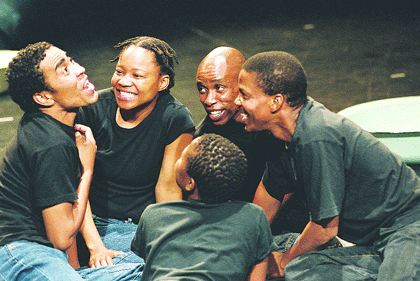By Scott Harrah
A play about the struggles of blacks in the poverty-stricken townships of South Africa during the apartheid years hardly sounds like an evening of lively, uplifting theater, but this illuminating import—which has received much acclaim in the United Kingdom, Ireland and Australia—is as emotionally upbeat and entertaining as it is sobering and poignant. Created and written by director Yael Farber in collaboration with five native South African actors that grew up during the years of unjust minority white rule, “Amajuba: Like Doves We Rise” tells stories of how the performers managed to survive as children in segregated shantytowns, such as the infamous ghetto Soweto.
South Africa’s apartheid finally ended in 1994 after years of protest and sanctions by the British Commonwealth, Europe and the United States. Since then it has become one of the most politically progressive and developed nations in the world, with a multicultural government that recognizes the rights of all races as well as gays and lesbians (the only in Africa to do so). However, just as Jews will never forget the atrocities of the Holocaust and wish to educate future generations about the horrors of anti-Semitism during World War II, South African blacks feel a need to keep alive memories of the “emotional shrapnel left behind from those dark years,” Farber said in program notes for the London production.
Little time, however, is spent discussing the ways the former all-white government oppressed the black majority during apartheid. The stories are far more apolitical and personal in nature, focusing instead on how each performer managed to stay alive in the rugged, crime-ridden townships. In a breezy and surprisingly jubilant 90 minutes, through a series of autobiographical vignettes and traditional African dance and song, the actors flawlessly bring this memory play to resonant life.
The five cast members, Tshallo Chokwe, Roelf Matlala, Bongeka Mpongwana, Phillip “Tipo” Tindisa and Jabullie Tshabalala, work seamlessly together as a team in gorgeously conceived and choreographed dance sets, but it is their individual monologues and vignettes that truly make the show remarkable. Bongeka Mpongwana tells how she and her sister were orphans and had to beg neighbors for food, but as little girls they somehow managed to subsist on a diet of wild spinach. Roelf Matlala, who is biracial and spoke the whites’ Dutch hybrid language, Afrikaans, tells how he was discriminated against by blacks for being a “half breed,” and Bongeka Mpongwana portrays his boyhood schoolteacher with a sense of wry aplomb. Mpongwana demonstrates how the teacher would smack him in class and berate him for being half white anytime he said the slightest thing that was incorrect. Others talk of gang violence, and one woman discusses why she was forced to leave her family in Soweto. Many black families were torn apart by the white government at the time in order to segregate blacks by tribes. Phillip “Tipo” Tindisa discusses how his father was so distraught over the policy that he refused to accept living in the family’s newly appointed government homestead, and he moved all his possessions out of the ghetto over a matter of days in plastic bags.
All the actors discuss the danger involved in the years toward the end of apartheid, when most were teenagers, and people who spoke out against the white government were often murdered. Tshallo Chokwe wanted to be a soccer player, but his dreams were shattered when he became a political activist as riots broke out and the whites began hanging blacks. As grim as the circumstances were for the performers, they manage to inject their stories with humor to shed light on the absurdity of everything that happened to them. Each cast member gives a trenchant performance, showing us tears, sweat, angst, and eventually joy. Yale Farber brilliantly directs this outstanding ensemble, allowing them to shine as a group while keeping the individual narratives cohesive and complementary to the overall theme of the story, which runs the gamut of human emotions, from fear and despair to a sense of optimism for the future of South Africa.
As the play closes, the stage floor is sprinkled with sand as the group dances in celebration of South Africa’s newfound freedom. The sand symbolizes rebirth and renewal in their war-torn homeland, and they sing metaphorically about being like doves rising from the ashes of oppression into peace. This is an inspiring message that is certainly relevant today as the Middle East devolves into chaos, showing that there is still hope in a world so torn apart by political turmoil, violence, intolerance, and hate. “Amajuba: Like Doves We Rise” is perhaps the best drama New York audiences will see Off-Broadway this year. It is that rare piece of theater that provokes thought and intellectual discussion, and lingers in one’s mind long after the show is over.
WWW Downtown Express

































